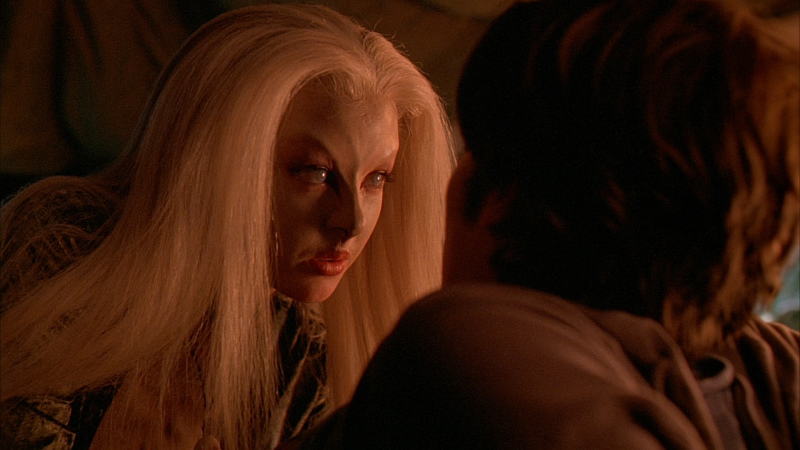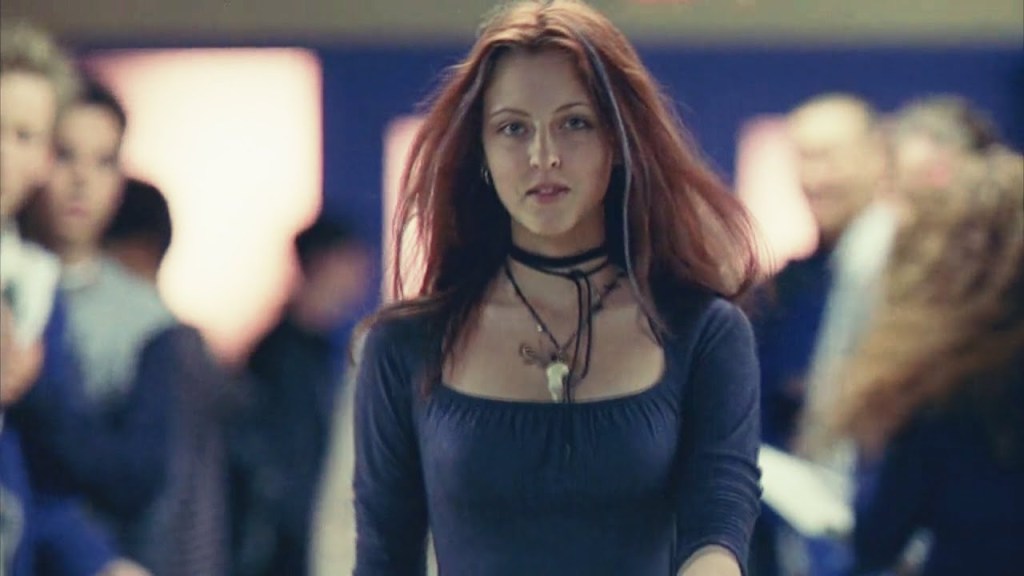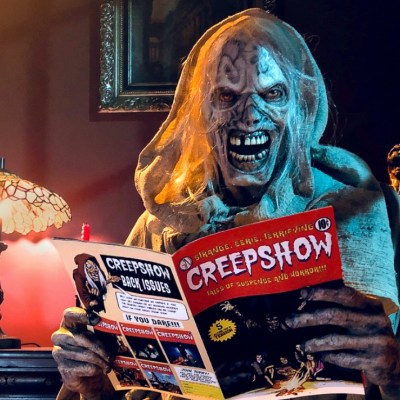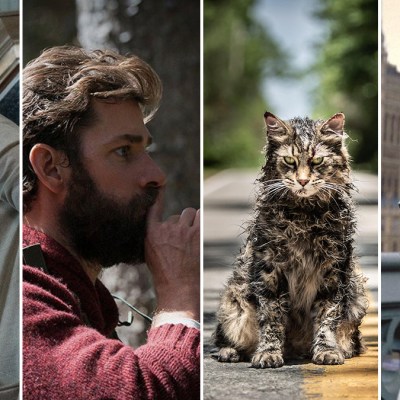Katharine Isabelle on How Ginger Snaps Explored the Horror of Womanhood
Twenty years after its release, Ginger Snaps star Katharine Isabelle discusses how a werewolf movie became a powerhouse and a transgressive metaphor.
In 2000 Mission: Impossible 2 topped the box office, Gladiator triumphed at the Oscars, and the first X-Men movie ushered in a new era of superhero movies. Meanwhile in Canada, while no one was watching, a new hero was emerging. Her name was Ginger, she was a 16-year-old girl, and ok, she might have turned into a monster and killed a few people but, wow, was she a ferocious figurehead for females everywhere.
“That’s what she’s about. She’s about fuck you, fuck the patriarchy, fuck the standard, fuck society, fuck the norm. And to me, that’s a hero,” says Katharine Isabelle, speaking with Den of Geek via Zoom from her home in Vancouver, 20 years after the film’s debut. Isabelle was just 17 when she stepped into Ginger’s very cool boots and she had no idea it would become a massive cult hit.
“When it first came out, no one fucking watched it. It did well with some critics at a few festivals, but no one cared. No one went to see it,” she recalls. “It wasn’t until it hit the VHS circuit in small town Canada that people were like, ‘Oh, Ginger!’ Emily [Perkins, who plays Ginger’s sister Brigitte] and I thought we’d be the only people that liked it because we were weird and dark. We had no idea that through the generations it would continue to have an effect on people.”
Watching 20 years on and Ginger Snaps absolutely holds up. More than that, in fact, it looks positively progressive and even transgressive in a year where we were onto our third Scream, our second Urban Legend, and our first Final Destination. Glossy teen slashers were the thing, which didn’t often make for great parts.
Read more
“In the ’90s, as a 17-year-old girl it was ‘be hot, get murdered’,” says Isabelle. “There weren’t a lot of really interesting characters coming out of that, especially in my small Vancouver, Canada acting world. So to see this and be like, ‘Holy shit, this really speaks to me, I am this dark, insecure, troubled, deep, dark humored girl who feels outcast and misunderstood by everybody,’ I was just like, ‘Yes. 100%.’”
Written by Karen Walton who would go on to write for Queer as Folk and Orphan Black, and directed by John Fawcett (one of Orphan Black’s co-creators), Ginger Snaps was a fresh take on the werewolf subgenre and a brand new slant on teen horror. This was about girls for a start – sisters Ginger and Brigitte who are weird outsiders fascinated with death. Though there’s sex in the movie it’s really a love story between the two females while the only male character who we have any sympathy for is a drug dealer who has no sexual interest in either. There are dog maulings along the way, and as we head towards the climax with Ginger becoming more and more monstrous, there’s plenty of gore.
But the most scandalous splash of blood is Ginger’s own first period.
Period piece
“You never see that. The visual of bloody panties is so shocking,” says Isabelle.
“It’s what, 2020 and we’re just seeing feminine hygiene products using red dye instead of this fucking blue shit? We’re always so mortified by this human experience that half of the people on the planet go through. And you know what? At the same time you should be, because being female is a fairly horrific fucking experience in itself. So guess what? Why don’t you fucking look at it once in a while? For it to be labeled as shocking is just so boring to me.”
It would be bold even in 2020. That color matching company Pantone only last month released a new shade of red inspired by periods as part of a campaign to end menstruation stigma shows it very much still exists. So to be this open in discussing it in 2000 in a horror movie – traditionally assumed to be the playground of young men – was a brave move.
“I remember a friend of mine, his older brother had taken his friends to see it and he was like, [Isabelle does impression of bro-tastic young man] ‘Oh yeah, we were all screaming and throwing shit at the fucking screen and then we walked out. All this fucking women shit.’ I was like, ‘Cool. Thanks, buddy. Awesome.’ Fuck you! They thought they were going to see hot girl tits and werewolf stuff and they weren’t prepared for an actual look into what the female experience is like. And they couldn’t handle it. Pussies.”
Suddenly it’s like I’m talking to wolf-Ginger, fierce, articulate, full of fire, the Ginger that punches the mean girl in the face for hurting her sister, the Ginger that isn’t going to stand for any of your shit any longer, the Ginger that could tear the flesh from your bones if she wanted to.
The metaphor of werewolf transformation and puberty is a no brainer to Isabelle.
“You’re going along your life perfectly fine, something happens to you, boom. In one day, you have all these strange urges, you have all these weird thoughts. Your body is completely abandoning you and morphing into something else that you are not comfortable with,” she says. “It’s a complete betrayal of everything you know and how you feel. And it creates this monster in you that you have to reckon with and deal with. It’s a brilliant allegory.”
Ginger Snaps is body horror. It’s a movie about a woman’s own body destroying her from the inside out. Before she knows what’s really going on Ginger is bleeding, weak, crippled with cramps. Weird hair starts sprouting – a shaving scene really hammers home the horror of teenagers taking razors to their legs.
But with this pain comes power. Ginger is suddenly confident, beautiful, strong, the boys at the school all desire her and she knows it. She will take who she wants and do what she wants – there’s some serious wish fulfillment going on at the same time as the trauma of her transformation.
Being Ginger
It’s not really surprising that Isabelle is so like this iconic character. She says she had an immediate affinity to Ginger – both sides of Ginger, the troubled outsider as well as the she-wolf.
“At that time, I wasn’t a good enough actor to have acted it. I just had to be myself,” she laughs, “They showed a pieced-together trailer halfway through to the cast and crew and I had a complete panic attack. It was my first panic attack, and I was like, ‘I’m fucking this up.’ This is the best character in the best movie and I clearly have no idea what I’m doing. I’m obviously the worst, this is terrible. I’m ruining this, I should just die. So all of the insecurity and the manicness…”
This just in: it’s shit being a teenage girl. Even more so when you’re 17, on location without your mother for the first time and working 18 hour days.
“I nearly fucking died!” she says. “Towards the end, it’s like a seven hour prosthetic piece when I’m full blown werewolf. I was living off of Oreos, McCain Deep Delicious Chocolate Cake, cigarettes, and Coca Cola. It was not good. And honestly, I wasn’t a good actor. So everything in that was just me being manic and sleep deprived and upset and insecure.”
Whatever was driving it Isabelle is excellent, flitting from difficult outsider with an undercurrent of fury to a whirlwind of teenage angst, sex, hunger, and violence that feels absolutely authentic.

Becoming the wolf
The effects are practical rather than CGI, which helps Ginger Snaps not to look dated on a rewatch. Ginger transforms gradually from woman to full blown wolf over days – she’s not a traditional werewolf who only becomes a wolf during the night of a full moon, instead once she turns fully she’s not coming back. Her different looks in the movie are cool and iconic – unsurprisingly Ginger Snaps cosplay is a ‘thing’ – which pleases Isabelle. The prosthetics procedure was somewhat less pleasing, however.
“I didn’t understand what the process was,” she says. “You see it in your head like you do when you read a book or whatever, or how the movie is going to be. You don’t think of the six hours on top of your 18 hour shooting day that you’re going to be inhaling alcohol-based paint until you’re high out of your fucking mind.”
The transformation came with other obstacles too.
“The process of losing my senses was a first for me. By the time I’m in the very late stage werewolf with the hair, the contacts and the claws, I can’t see anything, I can’t hear anything, I can’t smell anything, I can’t talk. I have fangs. I had to ADR most of the movie when I have fangs in. Because I had a lisp, so I’d be like, ‘Ask Tham. He’th the exthpert.’” She says, mimicking a line from the movie.
“It’s just terrible. I couldn’t touch anything and there is blood all over me, and it’s drying and I was trapped in my own body nightmare. You don’t really realize that when you go into it. So now when I read scripts, ever since then, I’m very like, ‘What does that exactly mean for the physical torture I will be experiencing through the duration of this?’ Let’s take a step back and just really look at this more closely,” she laughs.

Pain and gain
Isabelle is funny – like Ginger, she has a dark sense of humor and though we genuinely get the sense that the shoot was traumatic (“We were all fucking ill and we were shooting nights for about three weeks in a row, so you do not see daylight. You lose your mind. It wasn’t quite Apocalypse Now, but it felt like that to me when I was 17.”), she’s got great stories. Like the time she gave herself a concussion…
“There’s a scene where I slam my head on a desk and I was like, ‘Ginger probably really slammed her head on the desk.’ So I really did it a bunch of times and then woke up the next day with a fucking full on concussion headache. They had a doctor come in because I was fucked. He gave me Tylenol T3s and I took them on an empty stomach. I’m vomiting on set and they’re holding the roll, and I’ve got a bucket I’m puking into. And then immediately I had to do the slow motion walk down the hall scene. I was so fucked they had to put tape on the floor. I couldn’t walk in a straight line. I’m so mad every time I see that. I’m like ‘Fuck, you only get so many slow motion walking down the hallway looking cool and hot in your whole career, and you really fucked this one.’”
Of course, it doesn’t play that way on screen. It’s a key moment in the movie and even 20 years on, Ginger’s look still stands out. Costume designer Lea Carlson put together her outfits from thrift stores to create a kind of indie/goth cool with spot on accessories for an aesthetic that matched Ginger’s newly awakened give-no-fucks vibe.
“When that infection hits and she’s got that fucking attitude, it’s like, don’t we all wish we could just walk around with that attitude like a hero?” says Isabelle.
She says she can watch the movie now and enjoy it, though she couldn’t for a while.
”I haven’t seen it in 15 years because I tend to not revisit my most awkward moments on film as a teenager,” she laughs. But she now speaks fondly of this “wonderful sisterly love story.”
Ginger and B
She and co-star Perkins had known each other “forever” before filming began, having even been born in the same hospital and gone to the same elementary school so they auditioned for Ginger Snaps together. Perkins as the younger Brigitte (even though Isabelle is actually four years younger than Perkins) is sympathetic, awkward, vulnerable, and eventually heroic and there’s an obvious chemistry between the two. Isabelle recalls how between one of the auditions and the first time director John Fawcett came out to meet them Emily had shaved her head.
”I was like, ‘What are you doing? You’ve fucked this for us!’, I didn’t even recognize her in the room. And then thank God, we got the part. And that’s why she’s wearing this wig, this very offensive wig throughout the film…”
Why did she shave her head during casting for this movie? We can’t not ask…
“I don’t know. I don’t know. She was having a moment. She’s a very smart, progressive woman, and she was feeling her oats,” Isabelle laughs.
Despite the traumas of the prosthetics and the shoot, Isabelle has clear affection for the movie and a character who rings incredibly true even 20 years later, largely because of her authentic performance “It connects still to this day with people who weren’t even born when it came out. And that’s always shocking to me,” she says.
So what would today’s Katharine Isabelle tell her 17 year old self, 20 years ago?
“Oh, God. Fucking suck it up, you whiny bitch.” she says, all wolf-Ginger before swapping back to pre-transformation Ginger. “No, I would be like, ‘Yo, this is good, and you’re going to be okay. You’re gonna be good, and you’re not going to hate yourself as much as you think you do. And eventually, in 17 years, you’ll be able to watch this without having a total meltdown about how obviously terrible and insecure you are.”
She pauses.
“Isn’t that what everyone says to themselves 20 years ago? ‘You’ll be okay, don’t be so insecure, believe in yourself, you got this?’ I think that’s what everyone would say to their younger self. Also, ask for more money.”




